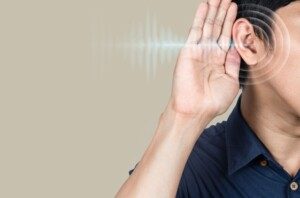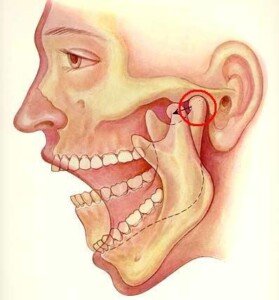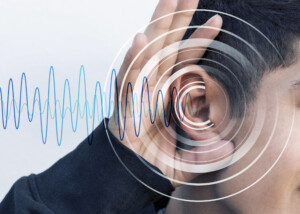
Pulsatile tinnitus is scarier than the ringing tone type, which is why people hope that their TMJ disorder is the cause of the pulsatile type rather than a more serious cause such as a brain aneurysm!
But how likely, though, is TMJ disorder a cause of one’s new-onset pulsatile tinnitus?
Pulsatile Tinnitus
• Often described as a whoosh, whoosh, whoosh or swooshing sound in the ear.
• Also commonly described as a thumping, beating or pounding sound.
• The sound usually occurs in synch with one’s heartbeat.
“I have infrequently encountered pulsatile tinnitus in my patients and have had some success managing it,” says Brijesh Chandwani, DMD, BDS, Diplomate, American Board of Orofacial Pain, with Connecticut & NY TMJ.
Dr. Chandwani continues, “In absence of a frank ear pathology, I think the nature of tinnitus depends on a few different factors (similar to TMJ disorders) including TM joint arthritis, neck and TMJ muscle mechanics.”
There is no data on what percentage of tinnitus cases — that are caused by TMJ disorder — are pulsatile in character – as subjectively described by the patient.
There is also no data on what percentage of people who suffer from pulsatile tinnitus of unknown origin also just happen to have a temporomandibular joint problem.
Keep in mind that it’s also entirely possible to have both a TMJ disorder and a problem unrelated to the jaw joint that’s causing the pulsatile tinnitus.
But one thing is clear: If you were to collect every person who was reporting pulsatile tinnitus, TMJ disorder as a cause would rank far down on the list – likely as the last possible cause.
Causes of Pulsatile Tinnitus Not Related to TMJ Problems
The Weill Cornell Brain and Spine Center site says that a 2013 review of current medical literature indicates that:
• About 28% of pulsatile tinnitus is caused be venous problems.
• 23% is due to arterial causes.
• 18% is due to both (arteriovenous).
• 31% is due to other or unknown etiology.
So for instance, a narrowing of a vein in the brain could cause pulsatile tinnitus.
Another cause is high blood pressure in the brain of no known origin, or a hardening of an artery.
It’s the change in blood flow that can be “heard” as the whooshing pulsatile tinnitus.
The whooshing can also be caused by a tumor in the head or neck. Most such tumors, however, are benign.
And yes, a brain aneurysm can cause pulsatile tinnitus. But so can an overactive thyroid or problems with bone tissue such as a benign lesion with concentrated blood vessels on the bone.
A report in Current Radiology Reports (Pegge et al) describes a slew of pulsatile tinnitus causes — but TMJ disorder is not one of them.
Pulsatile tinnitus is even LESS likely to be caused by TMJ disorder if it’s in only one ear.
Non-Pulsatile Tinnitus Caused by TMJ Disorder
“Tinnitus is a poorly understood disorder, and it is not even clear if it is due to a pathology of the ear or the surrounding structures,” says Dr. Chandwani.
“The TMJ and its muscles are in very close relationship anatomically with the ear; moreover, some part of the ear and jaw muscles share the same nerve supply.

Theirry Canuel, CreativeCommons
“Lastly, both TMJ disorders and tinnitus could be driven by the same area of the brain without any obvious (or known) disorder of the TMJ and the ear structures.
“Studies have shown that about 20 percent of tinnitus may be related to TMJ disorders even though the exact cause is not known.
“Concurrent symptoms of TMJ disorders do increase the likelihood that it is playing some role in tinnitus.
“TMJ disorders can either intensify an existing tinnitus symptom or cause it.
“Many patients find that they are able to modify their ear ringing by moving the jaw in a particular way or by eating chewy foods.
“For someone who is suffering from tinnitus, primary physician followed by a consultation with ENT physician should be done first.
“An orofacial pain dentist should be considered if there is no improvement.
“Possible scary symptoms if present along with tinnitus are loss of proper coordination in movements (ataxia), loss of balance, severe headaches and dizziness. Patients should consult a doctor asap if these are present.”

Dr. Chandwani has 15+ years of experience focusing on TMJ disorders and sleep disorders.
 Lorra Garrick has been covering medical, fitness and cybersecurity topics for many years, having written thousands of articles for print magazines and websites, including as a ghostwriter. She’s also a former ACE-certified personal trainer.
Lorra Garrick has been covering medical, fitness and cybersecurity topics for many years, having written thousands of articles for print magazines and websites, including as a ghostwriter. She’s also a former ACE-certified personal trainer.





































